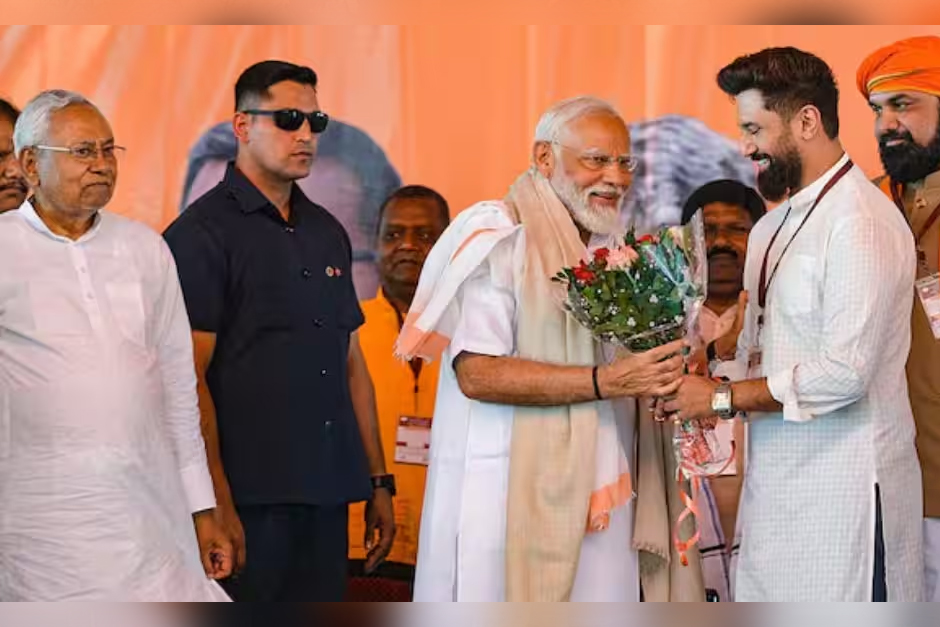Bihar’s political landscape, ever dynamic and often unpredictable, is once again witnessing a strategic jostle for power and influence within the ruling National Democratic Alliance (NDA). At the heart of the current debate is the Lok Janshakti Party (Ram Vilas) chief, Chirag Paswan, who, emboldened by his party’s impressive performance in the recent Lok Sabha elections, is reportedly asserting a demand for a Deputy Chief Minister post for his party. This ambition, however, faces significant resistance from the senior alliance partners, the Bharatiya Janata Party (BJP) and the Janata Dal (United) (JDU), setting the stage for a delicate balancing act ahead of future electoral battles.
The Paswan Push: Aspiration vs. Alliance Arithmetic
Chirag Paswan, often dubbed ‘Yuva Neta’ (youth leader) and seen by many as the inheritor of his late father Ram Vilas Paswan’s political legacy, has emerged as a significant force in Bihar politics. His party’s clean sweep of all five Lok Sabha seats it contested, achieving a remarkable 100% strike rate, has undeniably bolstered his bargaining power within the NDA. This stellar performance, particularly among the state’s Dalit voters (Paswan community), has positioned him as a crucial ally for the BJP-JDU combine, especially in a state where caste arithmetic often dictates political outcomes.
Sources close to the LJP (Ram Vilas) suggest that Paswan views a Deputy CM position not merely as a symbolic gesture but as a rightful recognition of his party’s growing influence and its crucial contribution to the NDA’s overall success. Such a role would provide his party with direct administrative power, enhance its visibility, and allow it to address the aspirations of its core vote base more effectively. It’s a move seen as consolidating his party’s standing beyond just parliamentary representation, projecting it as a significant stakeholder in state governance.
BJP and JDU: Holding the Line in a Coalition
The demand for an additional Deputy CM post, however, has been met with quiet but firm resistance from both the BJP and the JDU. The BJP, which currently holds two Deputy CM positions in Bihar – Samrat Chaudhary and Vijay Sinha – is wary of creating an unwieldy power structure. Adding another Deputy CM might not only dilute the existing power centres but also set a precedent for other smaller allies, potentially leading to further demands and complicating future power-sharing negotiations. The party’s focus remains on maintaining the existing structure and ensuring smooth governance, especially after the recent political realignments that brought Nitish Kumar back into the NDA fold.
The JDU, led by Chief Minister Nitish Kumar, is equally cautious. While the party’s Lok Sabha seat count (12) surpassed the BJP’s (17) in Bihar, the chief ministerial chair remains with Nitish Kumar. Any move to introduce another Deputy CM from a smaller ally could be perceived as further chipping away at the JDU’s already reduced dominance within the state’s power matrix. Nitish Kumar’s political career has often revolved around carefully calibrated alliances, and he is known for his pragmatic approach to power-sharing. The JDU would likely resist any change that could destabilise the delicate balance or diminish its prestige in the state administration.
A senior political observer, speaking on condition of anonymity, noted, “Coalition politics is a perpetual negotiation. Chirag Paswan is naturally leveraging his newfound strength. However, the BJP and JDU must consider the broader stability of the alliance and avoid setting precedents that could unravel the power-sharing formula in the long run. It’s a tightrope walk for all involved.”
Implications and the Delicate Balance Ahead
The standoff over the Deputy CM post highlights the inherent complexities of coalition governance, especially in states like Bihar where regional parties play a pivotal role. The BJP, as the senior national partner, faces the challenge of appeasing its allies without compromising its own strategic interests or upsetting the existing power dynamics. Keeping allies like Paswan content is crucial for the NDA’s long-term prospects, particularly with the state assembly elections due in 2025. Alienating a powerful Dalit leader like Paswan could have significant electoral ramifications.
For Chirag Paswan, the demand is a test of his political acumen and his ability to convert electoral success into tangible political power. His stance is not just about a position but about solidifying his party’s identity and influence. The resolution of this issue will undoubtedly shape the future trajectory of Bihar politics, influencing alliance stability, power equations, and potentially the electoral strategies of all parties involved in the coming years. The NDA’s ability to navigate this internal demand will be a crucial indicator of its cohesion and future electoral readiness in the state.
The current impasse underscores the constant churn in Bihar’s political landscape, where every electoral victory or setback invariably leads to new negotiations and adjustments within alliances. As the NDA leadership deliberates, the spotlight remains firmly on how this intricate political chess game will ultimately play out, defining roles and responsibilities within the coalition government and beyond.




